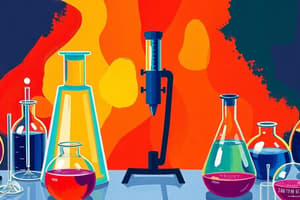Podcast
Questions and Answers
What is the primary purpose of analytical laboratory instruments?
What is the primary purpose of analytical laboratory instruments?
- To provide basic educational demonstrations
- To clean and maintain other laboratory equipment
- To qualitatively and quantitatively analyze samples (correct)
- To store chemicals and medications
Which type of laboratory is likely to require specialized instruments for studying microorganisms?
Which type of laboratory is likely to require specialized instruments for studying microorganisms?
- Chemistry lab
- Human biology lab
- Microbiology lab (correct)
- Anatomy lab
What is a crucial maintenance requirement for laboratory instruments to ensure accurate results?
What is a crucial maintenance requirement for laboratory instruments to ensure accurate results?
- Daily replacement of materials
- Frequent user training sessions
- Regular software updates
- Periodic cleaning and calibration (correct)
What role do medical laboratory services play in healthcare?
What role do medical laboratory services play in healthcare?
Which of the following body fluids is NOT commonly analyzed in a clinical laboratory?
Which of the following body fluids is NOT commonly analyzed in a clinical laboratory?
How do laboratory instruments contribute to disease control measures?
How do laboratory instruments contribute to disease control measures?
Which of the following is a requirement for laboratory instruments to ensure user safety?
Which of the following is a requirement for laboratory instruments to ensure user safety?
What is a common type of laboratory found in a medical setting that requires specialized instrumentation?
What is a common type of laboratory found in a medical setting that requires specialized instrumentation?
Flashcards
What is a laboratory?
What is a laboratory?
A room or building equipped with specialized instruments, tools, and materials used for various tests, experiments, and analyses. Labs can be used for teaching, research, or production of chemicals and medicines.
What is a laboratory instrument?
What is a laboratory instrument?
Any instrument, vessel, or tool used in a laboratory for performing experiments and analyses.
What are analytical lab instruments?
What are analytical lab instruments?
Devices specifically designed to analyze samples qualitatively (what substances are present) and quantitatively (how much of each substance is present).
Why is maintenance important for lab instruments?
Why is maintenance important for lab instruments?
Signup and view all the flashcards
What are patient specimens?
What are patient specimens?
Signup and view all the flashcards
What is the role of clinical laboratory instrumentation?
What is the role of clinical laboratory instrumentation?
Signup and view all the flashcards
What is the role of medical laboratory services?
What is the role of medical laboratory services?
Signup and view all the flashcards
What is Histology?
What is Histology?
Signup and view all the flashcards
Study Notes
Medical Laboratory Technology - Laboratory Instruments
- Laboratory instruments are tools, vessels, and other equipment used in labs for various operations.
- Analytical lab instruments have diverse functions, focusing on qualitative and quantitative sample analysis.
- Laboratory devices are often expensive and sensitive, requiring regular maintenance for optimal performance and accurate results.
- A laboratory is a room or building equipped for testing, experiments, analysis, teaching, or producing chemicals/medicines.
- Laboratory equipment varies based on its intended purpose (microbiology, physiology, immunology, human biology, histology, anatomy, chemistry, genetics). Each lab has specific instruments requiring detailed study.
- Common samples analyzed in clinical labs include blood, urine, stool, semen and other bodily fluids.
Clinical Laboratory Instrumentation
- Clinical lab instrumentation analyzes patient specimens to provide diagnostic and therapeutic information.
- Clinical lab instruments aid in disease diagnosis.
- Clinical lab instruments help evaluate the effectiveness of therapies.
Role of Medical Laboratory Services
- Medical lab services are crucial to health care, offering scientific support to promote, cure and prevent diseases.
- These services provide accurate information for treatment decisions.
- Lab services monitor patient responses to treatment and track infectious diseases.
- Labs play a role in controlling major prevalent diseases.
- Lab services prioritize health concerns and allocate resources effectively.
Microscope
- A microscope is a laboratory instrument used to examine objects too small to be seen with the naked eye.
- Microscopy is the study of small objects and structures using a microscope.
Types of Microscopes
- Microscopes are categorized by their methods of interacting with samples to produce images.
- Optical microscopes use lenses to refract light through thinly sectioned samples.
- Other types include fluorescence microscopes, electron microscopes (transmission and scanning), and various scanning probe microscopes.
- Specific types of microscopes include light microscopes, compound microscopes, stereo microscopes, inverted microscopes, fluorescence microscopes, atomic force microscopes, confocal microscopes, retinal imaging microscopes, laser microdissection microscopes, and electron microscopes.
Studying That Suits You
Use AI to generate personalized quizzes and flashcards to suit your learning preferences.



